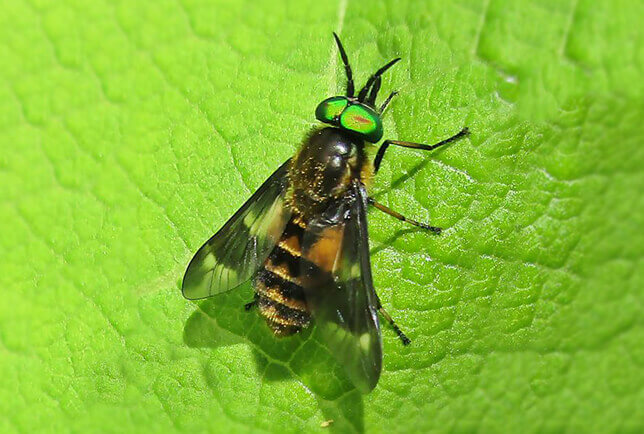What Do Horse Flies Look Like?
Most people recognize horse flies because of their large size. The pests average about an inch in length with a head as big as their bodies. Some species are grayish-black, while others have colorful patterns. Most horse flies have big iridescent eyes and either clear or solid color wings. The insects can fly faster than mosquitoes and hunt prey by sight and movement.
How Can I Tell if I Have a Horse Fly Problem?
Female horse flies need blood meals to lay eggs. The pests usually feed on livestock, but they will also prey on humans as well as pets. A few signs of horse fly issues include:
- Bites – Bites become red, itchy, and swollen, often developing a raised welt or hives around the site. Affected animals may lose fur due to excessive scratching.
- Swarms – When gathered in groups, horse flies are a persistent hazard to cattle and other livestock.
How Do Horse Flies Get Inside Homes and Businesses?
Horse flies prefer the outdoors and rarely enter houses. However, shiny surfaces and movement attract the pests, and they can be a serious issue around swimming pools in backyards, resorts, and hotels. Horse flies also affect homes near pastures and marshes, making gardening, yardwork, and outdoor recreation difficult.
Farms, dairies, stables, and other commercial properties involving livestock are most likely to have trouble with these pests. Reduced milk production and grazing problems often occur when horse fly infestations affect beef and dairy cattle. These disruptions make things difficult for businesses that rely on locally sourced dairy products, too.
Are Horse Flies Dangerous?
When a female horse fly takes a blood meal, their mouthparts act like blades to cut into the skin. Then, the pests lap at the pool that forms from the wound. A horse fly’s saliva causes pain and swelling for most people, but those with allergies may have severe reactions that require medical attention.
In addition to livestock, dogs, cats, and other pets are targets for horse fly bites. Obsessive scratching and secondary infections are common. Herd animals can suffer significant blood loss due to horse flies and may even injure themselves in their rush to get away from the insects. Horses are also vulnerable to equine infectious anemia, a disease transmitted by these pests.
How Can I Prevent a Horse Fly Infestation?
Horse flies, like all flies, are difficult to control. The pests typically don’t land long enough for most sprays and repellents to be effective, although certain types of traps can help. To protect the animals on your property, keep them in clean shelters during the day and let them graze at night. Call Waltham Pest Services or contact us online for assistance with horse flies near your home or business.
